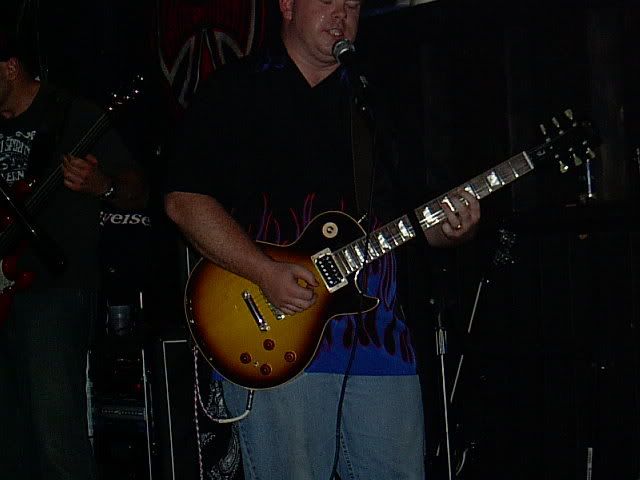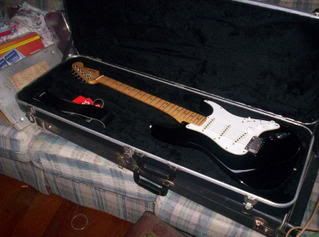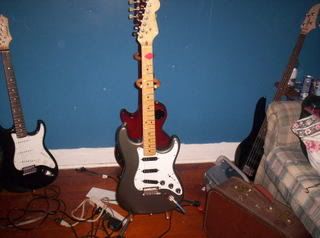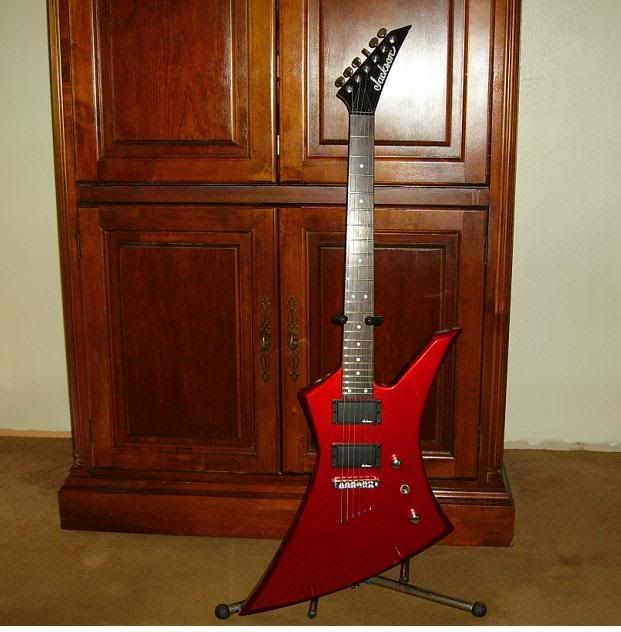
Posted on 09/18/2007 5:14:02 PM PDT by Drew68
An Oakdale music store owner was arrested Monday for selling fake versions of the legendary Gibson guitar at his Montauk Highway shop, the Suffolk police said.
Investigators seized 15 fake Gibsons from the store, the police said.
Bernard Musumeci, 44, of 2 Domino Way, Centereach, surrendered to the police Monday night, and was charged with trademark counterfeiting.
After he was released, Musumeci turned over another 18 guitars from his home, and Gibson Guitar Corp. experts will determine whether they're authentic.
The arrest came after a two-month investigation by Fifth Squad detectives, working in conjunction with the Nashville-based Gibson company.
After authorities were alerted that Musumeci may have been selling fakes at Oakdale Music, at 925 Montauk Hwy., an undercover security expert from Gibson determined that several guitars from the store were, indeed, counterfeit.
Suffolk detectives applied for and executed a search warrant earlier this week and the 15 guitars, all of which were determined to be counterfeit, were seized at the music store.
Now based in Nashville, the original Gibson Guitar and Mandolin Company was founded in 1894 in Kalamazoo, Mich., by shoe clerk and musician Orville Gibson.
Gibson now produces what many consider the world's foremost guitars, especially reissues of the Les Paul model first manufactured in 1952.
Authentic Gibsons are pricey. An original 1959 Gibson Les Paul Flame Top guitar was listed on eBay Monday at a buy-it-now price of nearly $100,000. And a 2007 reissue of the same guitar was listed for $4,500.
(Excerpt) Read more at newsday.com ...
“Is that a Hot Rod Deluxe or Deville you have in the corner?”
Deluxe. I sold it and bought a Peavey VTM 60 and a Marshall 4x12 bottom.
Good eye! :0)
On the flip side, there are very convincing counterfeits out there that could easily command several thousand dollars from knowledgeable buyers.
There was a big to-do about these on the guitar forums a year or so ago. The ones coming off ebay were utter garbage, from all that I read.
One-offs by individual luthiers may, indeed, be spectacular - Max and Derrig come to mind immediately.
LOL good point.
“It’s a counterfeit of a LP Custom - they have the rectangular inlays,”
You’re right. I forgot about the Custom.
Either way it’s a fake.
The overall quality of guitars these days is just incredible. The industry has matured to the point where there’s really no reason to make a bad guitar anymore. All the bad designs have been tried and discarded. CNC machines get a bad rap for churning out soulless guitars but there’s no denying they’ve massively improved consistency, especially at the lower end of the market. And then at the high end there are the custom shop guitars. I haven’t tried the Gibsons but the Fenders are superb. The best Strat I’ve played was a mid-90s custom shop model that a friend of mine owned. However, my $400 Ibanez Talman, which is basically a strat with a reshaped body, gets surprisingly close. In the world of guitars, the gap between rich and poor has become very small and reduced mainly to unquantifiable mojo factors.

They’d properly be block (square/rect) inlays on a LP Custom. On Deluxes, yes, trapezoids, but there would be no Super-400 type center-peghead inlay on Deluxes. Nor do Deluxes even have a first-fret inlay.
 i just wish i was as good as the guitar...
i just wish i was as good as the guitar...



Nice!
:0)
I just bought a Jackson.

The BC Rich just wasn't cutting it.
...In the world of guitars, the gap between rich and poor has become very small and reduced mainly to unquantifiable mojo factors.
You are entirely correct. Musicians really owe a debt of gratitude to Hartley Peavey for introducing CNC routing to guitar manufacturing which has allowed for good quality guitars to be produced for reasonable prices.
My first "real" electric guitar was a Hondo II Les Paul copy I got when I was 14. It was plywood with a bolt-on neck. It was really a lousy guitar and I quickly outgrew it. This was in 1983. If I was starting out today, I'd probably start out with a Squier, Epiphone or even a Mexican Fender and have a pretty good instrument that I could learn on and it would be good enough to play professionally as I progressed.
Sounds like you really know your way around Gibsons.
:0)
I hear ya. I only WISH I could play it like it looks.
And your market is being flooded with guitars with the same serial number.....look and sound.......sigh.
Totally agree wrt consistency, and this is why I felt OK buying a known model off ebay, because I was looking for the ultra-wide blade neck characteristic of several rose-board Strat-Pluses I’d played. The one I bought was exactly like the examples I had tried. This is the part about being (in part) a mechanical device that only a costly “hand-made” guitar can match for even finish all up & down the neck.
My uncle played and worked on pianos and he sold two Steinway grands and ended up with a couple of Korean Young Changs. I asked him how in hell he could get rid of those incredible old Steinways...his reply was (insert the most edgy, crotchety, irritable voice you can imagine) that they were nothing but mechanical devices. Newer was better, the older ones always needed tweaking and fiddling with and costly weird repairs. Before that conversation I always assumed that older was better.
 course i still have my Univox mule too...
course i still have my Univox mule too...
“And your market is being flooded with guitars with the same serial number.....look and sound.......sigh.”
And that’s why you need to educate yourself about any guitar you want to buy.
Ask questions. Get a second opinion. Even call the manufacturer if you think you are dealing with a fake.
My purchases were not really unusual but merely a matter of the seller not being educated in the valve of what they had or, in the case of the new one, a mistake by a sales person.(which is a long story but I’m not ashamed of the outcome one bit).
Any how. Do research before you lay down your cash.
Applies to anything you buy.
Disclaimer: Opinions posted on Free Republic are those of the individual posters and do not necessarily represent the opinion of Free Republic or its management. All materials posted herein are protected by copyright law and the exemption for fair use of copyrighted works.